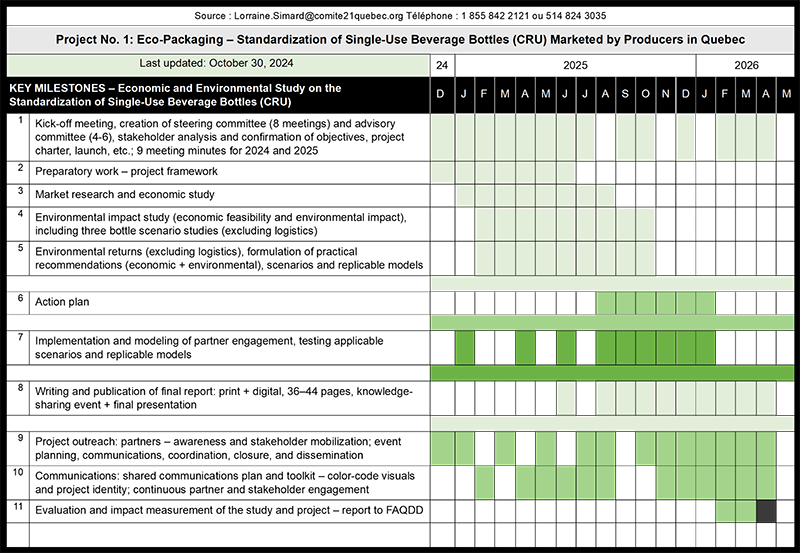Marina Pietrosel: Expertise in EPR compliance, eco-packaging design, material changes, and innovation.
Marie Horodocki-Aymes: Expertise in sustainable marketing and responsible innovation.
Lorraine Simard: Expertise in ESG, circular economy, and responsible communication.
An economic and environmental study and stakeholder engagement project will begin this fall. The ultimate goal is to provide a replicable framework model for all types of beverage processing industries. The cohort of participating companies and organizations will contribute data and share experiences required to develop scenarios and a scalable model.
The introduction of an expanded deposit-return system and the designation of a single management organization (OGD) will transform the current model. Although new environmental trends are generating growing interest among bottlers and consumers, it is essential that this system be developed using a sustainable and realistic model—hence the need for this study as part of a thoughtful transition.
In collaboration with industry partners, the project aims to document the standardization of single-use beverage bottles (CRU) marketed by food processing producers in Quebec.
This work will be followed by a second study to understand producers’ perceptions, consumer habits, and logistical requirements.
The multi-use container (CRM) is a leading example of a circular economy model in Quebec and has indisputably lower environmental impacts compared to single-use containers (CRU). Yet, its use is declining in favor of CRUs).
The primary objective expressed by stakeholders is to validate the economic feasibility of standardizing beverage bottles in Quebec and to understand the economic benefits.
Once the first objective is completed, the committee also aims to assess the environmental impact and, finally, validate the broader impacts—costs and feasibility—of standardizing single-use beverage bottles in Quebec.
Several relevant studies have been conducted in Europe and the United States. This project will include a literature review, from which best practices will be enhanced and adapted to Quebec’s context. The project will also address emerging challenges related to resources, consumption trends, and initiatives in other Canadian provinces.
Phase 1 of the study will gather information on beverage bottle standardization and identify key characteristics (manufacturing, sourcing, and operations), challenges, barriers, and potential solutions.
The proposed methodology aims to:
Phase 2 of the study will assess the environmental impact and broader implications of standardizing single-use beverage bottles (CRU).
The proposed methodology aims to:
Two committees will be established:
Meetings will be organized in collaboration with partners to ensure the project’s completion.
These meetings will also serve to:
The quality of the analysis will largely depend on information shared by the industry stakeholders. Therefore, collaboration from all project partners is essential. The goal is to engage all relevant actors to ensure the project’s success.
The project team is fully committed to protecting the confidentiality of the data provided. This will be clearly communicated to reassure participating companies, and the corresponding measures will be explained.
The following stages and elements will be considered (non-exhaustive list):
Following the study’s findings, all beverage processing producers will be able to make informed, viable, and concrete decisions regarding the use of standardized bottles.
The Quebec Action Fund for Sustainable Development (FAQDD) will fund up to 75% of the total study cost. The remaining 25% will be covered collectively by beverage processing producers and partners.
The estimated budget for Phase 2 – the cohort study – is close to $400,000.
The steering committee will be composed of organizations contributing to the planning and enrichment of the study’s data.
The advisory committee will include various organizations and companies from across the value chain: bottle manufacturers/producers, bottlers, and packagers.
Working groups will be formed based on need (e.g., operational data or by sector). At each phase, information will be reviewed and validated by the steering committee. An estimated 4 to 6 meetings will be held over the course of the project once it is approved.
Deliverables, subject to approval by the working/steering committee, include:

Marina Pietrosel: Expertise in EPR compliance, eco-packaging design, material changes, and innovation.
Marie Horodocki-Aymes: Expertise in sustainable marketing and responsible innovation.
Lorraine Simard: Expertise in ESG, circular economy, and responsible communication.